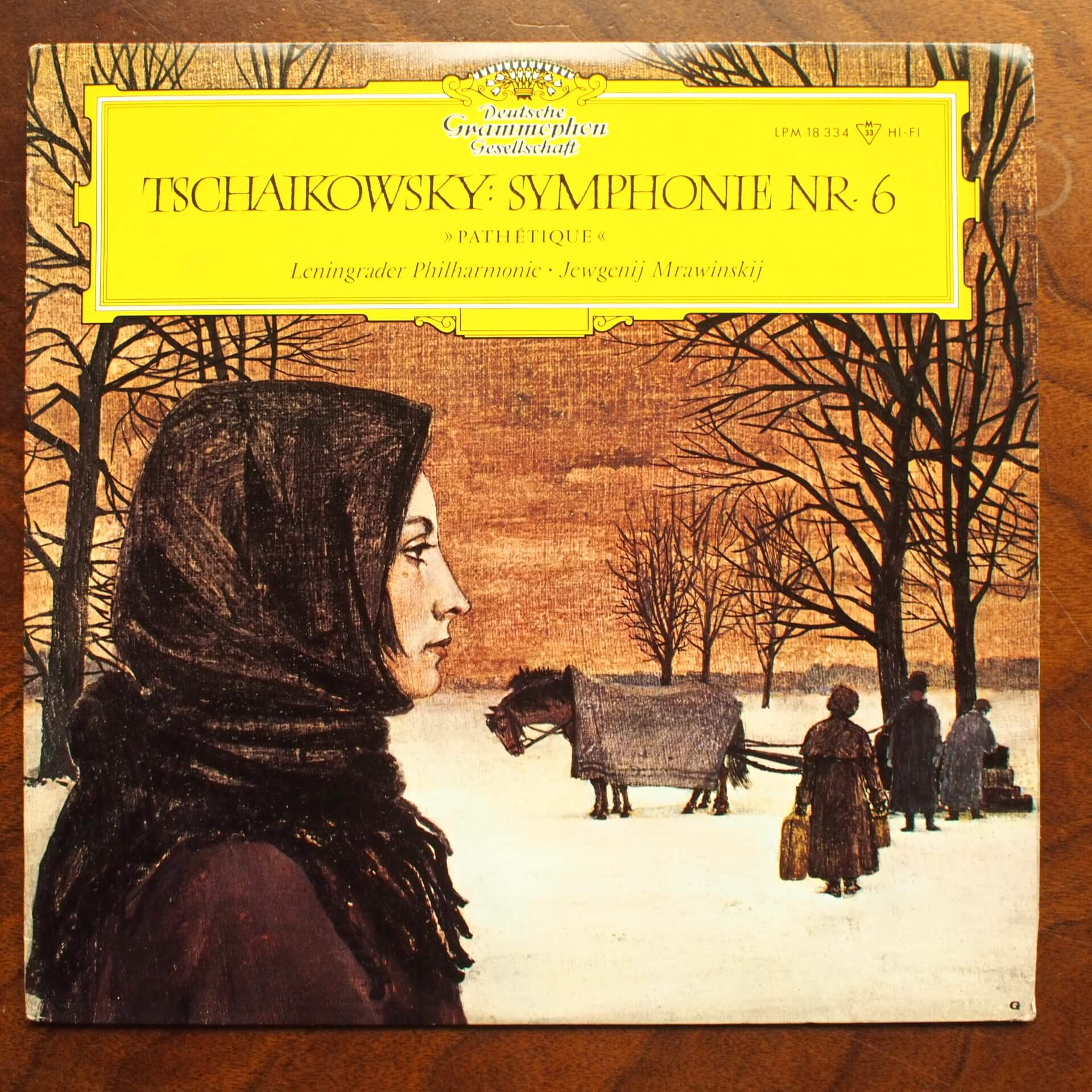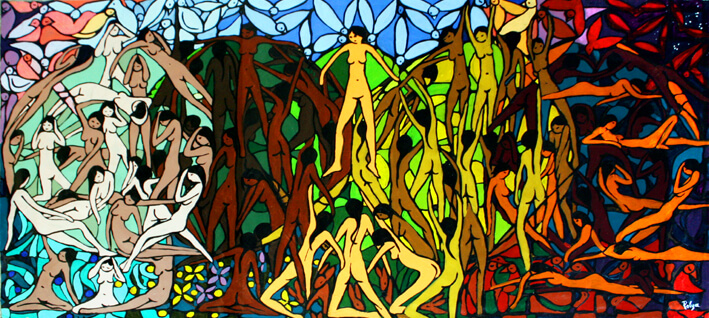
Ramblings
Saunterings
Ramblings: about North-West England
Ramblings is a set of articles about North-West England, of unknown authorship and
indeterminate date, believed to have been written for amusement on rainy days,
which are not unknown in North-West England.
29. How Pathétique
 “What’s it about?” - a reasonable question to ask before
committing oneself to sitting through a long symphony,
don’t you think? Serious musicians, schooled in the conservatoires
of Europe, imbued with a lifetime’s experience of the theory and
practice of classical music, and dedicated to superciliousness, will
reply “It’s about fifty minutes”. A symphony, it seems, should just
be itself and not be about anything.
“What’s it about?” - a reasonable question to ask before
committing oneself to sitting through a long symphony,
don’t you think? Serious musicians, schooled in the conservatoires
of Europe, imbued with a lifetime’s experience of the theory and
practice of classical music, and dedicated to superciliousness, will
reply “It’s about fifty minutes”. A symphony, it seems, should just
be itself and not be about anything.
Serious musicians listen askance, if they listen at all, to the sixth
symphony of Tchaikovsky. I, on the other hand, listen attentively.
To the untutored ear, or two of them in my case, the music seems to
accompany some sort of narrative. But what, if any?
Consummate professional that he was, Tchaikovsky died a few
days after the symphony’s first performance, leaving a note saying
that the symphony is about life and death. That may not seem to
reduce its scope much but it does, I suppose, rule out, say, goulash
and giraffes. Be that as it may, the symphony’s programme was,
I am sure, revealed to me during an exhilarating concert given on
Saturday by the Lakeland Philharmonia.
The first half of the concert was strangely elusive. Fragments
of music were separated by longueurs of apparent silence, ended
by whispered shushes and pokes in the ribs. My mind kept drifting
back to the long walk we had taken earlier in the day; my
body felt pleasantly exhausted. I forewent the interlude ice-cream,
preferring to rest my aching limbs and to doze contentedly
awaiting the symphony.
The music began hesitantly,
depicting Amy returning to the car for her gloves, and then Peter
going back to check the car had been re-locked. The woodwind
hovered uncertainly, like the birds over the reservoir. And then
the music began to bustle along, with the fluttering semi-quavers
denoting the wind among the conifers of The Rigg. As we emerged
from the trees, there was a brief silence and then a marvellous
melody arose, representing the wonderful sight of Riggindale and
the ridges ahead of us.
We bowled along, until we were again reduced to silence
by the awesome view. An explosive chord accompanied Peter’s
fall off Bowderthwaite Bridge. Then jabbing syncopations, as
we split into two or three groups, took us up the foothills. The
developing whirlwind was heard in the woodwind and brass,
with far-off rumbles of thunder in the cellos and basses. The most
magnificent passage maintained the excitement until, after much
heroic scrambling, we emerged to the relative peace of the knobbly
edge of Kidsty Howes.
 After a short pause for coughs and coffee, we were off again,
waltzing up the ridge in 5/4 time, by which Tchaikovsky skilfully
described little Amy taking five steps to everyone else’s four. This
was a jolly section, in which everybody glided along in harmony,
apart from Peter, represented by a drone bass, complaining of the
pains from his fall. And in what seemed no time at all, we arrived
at the noble nose of Kidsty Pike, for more coughs and coffee.
After a short pause for coughs and coffee, we were off again,
waltzing up the ridge in 5/4 time, by which Tchaikovsky skilfully
described little Amy taking five steps to everyone else’s four. This
was a jolly section, in which everybody glided along in harmony,
apart from Peter, represented by a drone bass, complaining of the
pains from his fall. And in what seemed no time at all, we arrived
at the noble nose of Kidsty Pike, for more coughs and coffee.
The next section began with dancing triplets, as we skipped in
threes along the ridge to the Straits of Riggindale. The soft trombones
unmistakably pointed out a small herd of deer over towards Low
Raise. As we reached High Street a splendid march tune broke out,
leading us swaggeringly along, like Roman warriors surveying far
and wide, briskly striding out, banners aloft, swords a-gleaming.
A tremendous crescendo took us irresistibly up, and after blood-tingling fanfares we collapsed exhausted at the trig point.
Breathless, we sat for more coughs and coffee and a cress and
cucumber sandwich or two. We felt, somehow, that the symphony
was complete, with this moment of triumph. But no, the violins
began a grief-stricken phrase to move us, with great reluctance, to
descend along Rough Crag.
Our sadness at leaving the glorious High Street was driven
into the depths of despair as Harry, a solo bassoon, told us about
Haweswater, which we could see ahead of us, drowning the
old village of Mardale Green. The suffering of the villagers was
movingly conveyed by a lugubrious tuba, and a single soft stroke on
the tam-tam represented disconsolate Myrtle’s sigh of lament. We
dropped lower, pausing from time to time to survey the mournful
scene but unable to escape our slough of despond. The wailing
strings and sombre brass took the group deeper and deeper, and as
we finally reached the car-park we were enveloped in a tormented
and total silence.
When a symphony ends on pppp it is hard to be sure that
you have had that final p. I slumbered there, overcome by this
stupendous, revelatory performance, for what may have been
hours, stirring only when I gradually became aware of murmurs:
“Is he dead?”, “I think he’s breathing”, “Shall I prod him?”.
Photos:
Tchaikovsky Symphony 6.
One Day Pathétique by Gideon Polya.
(According to Polya, “Using naked female forms the painting reveals a
joyful hopeful, dawn to night, ‘one day in the life of Pyotr Tchaikovsky’
interpretation of his so-called Pathétique Symphony”.)
Comments:
• Considering
Tchaikovsky’s aversion to naked female forms, Polya's interpretation
seems much less plausible than yours.
• Musicologists have, however, rejected your
theory about Tchaikovsky’s
6th Symphony on the grounds that, although Tchaikovsky did visit
England in 1893 (the year he composed the symphony) there is, as yet, no
evidence that he travelled to the Lake District.
Ramblings
Saunterings
© John Self, Drakkar Press, 2024-

Top photo: Rainbow over Kisdon in Swaledale;
Bottom photo: Ullswater


 “What’s it about?” - a reasonable question to ask before
committing oneself to sitting through a long symphony,
don’t you think? Serious musicians, schooled in the conservatoires
of Europe, imbued with a lifetime’s experience of the theory and
practice of classical music, and dedicated to superciliousness, will
reply “It’s about fifty minutes”. A symphony, it seems, should just
be itself and not be about anything.
“What’s it about?” - a reasonable question to ask before
committing oneself to sitting through a long symphony,
don’t you think? Serious musicians, schooled in the conservatoires
of Europe, imbued with a lifetime’s experience of the theory and
practice of classical music, and dedicated to superciliousness, will
reply “It’s about fifty minutes”. A symphony, it seems, should just
be itself and not be about anything.
 After a short pause for coughs and coffee, we were off again,
waltzing up the ridge in 5/4 time, by which Tchaikovsky skilfully
described little Amy taking five steps to everyone else’s four. This
was a jolly section, in which everybody glided along in harmony,
apart from Peter, represented by a drone bass, complaining of the
pains from his fall. And in what seemed no time at all, we arrived
at the noble nose of Kidsty Pike, for more coughs and coffee.
After a short pause for coughs and coffee, we were off again,
waltzing up the ridge in 5/4 time, by which Tchaikovsky skilfully
described little Amy taking five steps to everyone else’s four. This
was a jolly section, in which everybody glided along in harmony,
apart from Peter, represented by a drone bass, complaining of the
pains from his fall. And in what seemed no time at all, we arrived
at the noble nose of Kidsty Pike, for more coughs and coffee.
